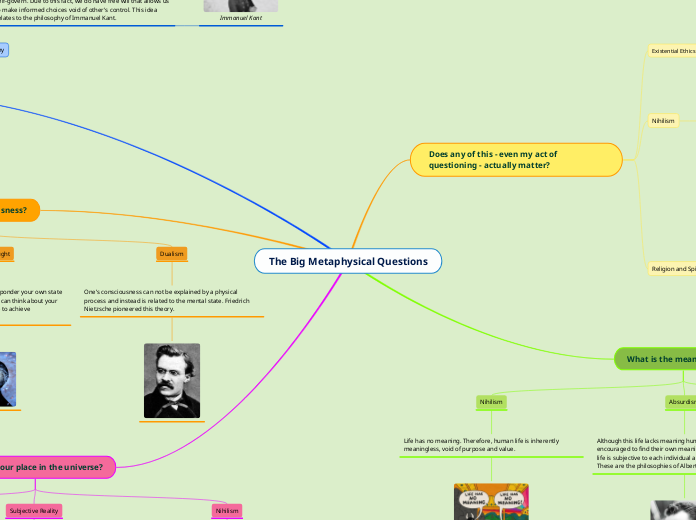The Big Metaphysical Questions
What is our place in the universe?
Because life lacks meaning, our place in the universe does not matter, making the question redundant. There is no reason to contemplate our position as it's unimportant. This relates to the theories of Friedrich Nietzsche.
Subjective Reality
Our place is what we make it to be. If one determines that their role is a mother, teacher or chef it is so because their reality is subjective to what they perceive it as.
Subtopic
Looking through the lens of Christianity, humans have dominion over all the other creatures on earth and are here to take care of them.
Ex: In Christian ideology, it is noted that humans have control over the earth and all of its creatures. This concept can be seen in Genesis 1 verses 26-31 (the very first book of the bible). Modernly the bible and its verses, although thousands of years old, are used to explain one’s purpose and place on this earth.
What is consciousness?
Dualism
One’s consciousness can not be explained by a physical process and instead is related to the mental state. Friedrich Nietzsche pioneered this theory.
Higher Order Thought
Consciousness is found in the ability to ponder your own state of mind. This means that only once you can think about your own feelings and thoughts are you able to achieve consciousness.
Materialism
Consciousness is a product of the brain’s processes and can be explained based on physical neural activity. Thomas Hobbes supports this theory.
Ex: According to various scientific articles, there is no concrete evidence for what comprises one's consciousness, but according to NewScientist “The orthodox scientific view today is that consciousness is a property of physical matter, an idea we might call physicalism or materialism.”. Modern day scientists continue to lean towards studying consciousness through the lens of neural activity completely disregarding dualism and instead favoring materialistic theories.
Do we have free will?
Autonomy
Everybody has the capacity to make their own decisions and self-govern. Due to this fact, we do have free will that allows us to make informed choices void of other's control. This idea relates to the philosophy of Immanuel Kant.
Immanuel Kant
Ex: When it comes to abortion laws, it is often argued that women should have bodily autonomy to decide if they would like to keep their fetus or not. Famous writer Judith Thompson pioneered this idea of women's body autonomy, or in other words freewill to make decisions. Over everything else she and many others argue that women should have the right to decide what happens to their bodies.
Indeterminism
We all have free will and most events exist by chance and not by prior causes. Because events occur uniquely of each other, controlling them or exercising your “free will” is plausible.
William James
Determinism
We do not have free will because everything has already been predetermined. It is almost impossible for someone to change the path that they are on, meaning that free will is absent.
What is the meaning of life?
Ethics and Morality (Utilitarianism)
The meaning of life is to “achieve the greatest amount of happiness for the greatest number of people”. Through helping others one can give their life meaning.
Ex: In a medium article author Dada Bhagwan stated that “Happiness begins from the moment you do something for others”. This keypoint can be seen in utilitarianist philosophies and Dada goes even further remarking that “Research indicates that they are less stressed and experience improved mental health”. This adds some substance to the theory that the meaning of life may just be helping others as it does have positive effects on one’s mental health.
Absurdism
Although this life lacks meaning humans should be encouraged to find their own meaning. Hence, the meaning of life is subjective to each individual and what they deem it to be. These are the philosophies of Albert Camus.
Albert Camus
Life has no meaning. Therefore, human life is inherently meaningless, void of purpose and value.
Does any of this - even my act of questioning - actually matter?
Religion and Spirituality
In Buddhist thought, the concept of "mattering" is tied to the cycle of suffering and the pursuit of enlightenment. Therefore, the act of questioning can matter as it can lead to self-awareness or “enlightenment”.
Nihilism
Life lacks inherent meaning or value, and therefore, the act of questioning or any other action ultimately holds no significance.
Ex: A recent trend on Tiktok has been showing embarrassing situations that someone might have gone through and then zooming out to show a bigger picture of earth. The point of these videos is to highlight that in the grand scheme of things nothing matters, which is a key point in nihilism. These videos showcase that there is no point in questioning your experiences because in the end nothing matters, as can be seen in the Tiktok below.
TikTok
Existential Ethics
Existentialist philosophers like Jean-Paul Sartre argue that the act of questioning is a manifestation of one's consciousness. The act of questioning matters because it reflects your capacity for self-awareness.









